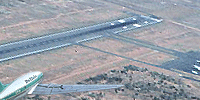 |
 |
|
||||
|
Aspen/Pitkin County Airport (IATA: ASE, ICAO: KASE, FAA LID: ASE), also known as Sardy Field, is a county-owned public-use airport located three nautical miles (6 km) northwest of the central business district of Aspen, in Pitkin County, Colorado, United States. Aspen/Pitkin Co. Airport/Sardy Field covers an area of 573 acres (232 ha) at an elevation of 7,820 feet (2,384 m) above mean sea level. It has one asphalt paved runway designated 15/33 which measures 8,006 by 100 feet (2,440 x 30 m).
It is included in the Federal Aviation Administration (FAA) National Plan of Integrated Airport Systems for 2019–2023, in which it is categorized as a non-hub primary commercial service facility. Taking off runway 33 at Aspen-Pitkin Airport. Public Domain. HistoryThe site of Aspen/Pitkin County Airport was first occupied by settlers in 1881, with the establishment of the Stapleton ranch, a 320-acre homestead. The first building on the site, a log cabin, sat on the east side of the present-day runway. The Stapleton family grew potatoes and raised animals, including sheep, cattle, and hogs. A private gravel airstrip opened on the Stapleton ranch in 1946, promoted by Walter Paepcke and John Spachner. The airstrip was open to the public, but was mostly used by the aviation department of the Aspen Institute, the precursor of Aspen Airways. The Pitkin County government gained control of the gravel airstrip in the 1956, and began a project to pave the runway. County commissioner Tom Sardy headed the project, and the airport was renamed Sardy Field in his honor in 1958. The original paved runway was 5,000 by 50 feet (1,524 by 15 m). The runway has been expanded four times since, reaching its current dimensions in 2011. FacilitiesFor the 12-month period ending November 30, 2020, the airport had 38,584 aircraft operations, an average of 106 per day: 52% general aviation, 29% air taxi, 18% scheduled commercial, and 1% military. In November 2020, there were 95 aircraft based at this airport: 66 single-engine, 10 multi-engine, 13 jet, 5 helicopter, and 1 glider. Aspen/Pitkin Co. Airport has more regular service from major carriers than any other regional ski town airport in North America. In the winter, its regular, weekly flights number more than 170 (not including extra flights often run during busy holiday seasons). In addition to regular service from Denver, Aspen sees more than 20 flights a week from Chicago and Los Angeles. RunwayIn 2007, the runway was completely rehabilitated with new grooved asphalt. A partial length parallel taxiway A is located 320 ft (98 m) from the runway centerline on the east side of the runway, and serves general aviation on the north end of the airport and the commercial terminal on the south end. The airport meets modified FAA D-III airport reference code standards. On April 4, 2011, the airport began a $15.5 million runway extension project which added 1,000 feet of runway length to the existing 8,006 feet long runway. This project was completed on November 2, 2011. TerminalThe Aspen/Pitkin County airport terminal is a 44,000 square feet (4,100 m2) single floor facility, which has undergone several renovations since its original construction in 1976. The airport terminal hosts six rental car operations, a year-round guest services operation, plus Jeddadiahs restaurant and gift shops. The terminal has a cellphone parking lot to accommodate motorists waiting to pick up passengers. The 40 spaced parking lot is located in a manner to allow motorists to loop and re-access the terminal without getting back on HWY-82. Parking is not allowed in front of Aspen’s airport terminal. OperationsSafetyThe Aspen/Pitkin County Airport is certificated as a Class I, ARFF Index B commercial service airport under FAR Part 139. The airport's operations department is responsible for daily compliance with FAA Part 139, including daily airport safety inspections, rules and regulations enforcement, and aircraft rescue and firefighting (ARFF). In July 2009, the airport took delivery of a new Oshkosh Striker 1500 Index B ARFF truck. Mutual aid response to airport incidents is provided by the Aspen Fire Department, Pitkin County Sheriffs Department, Aspen Ambulance, and others. Airport operations staff operates from the airport's Operations Center, constructed in 2006 on the west side of the airport. This facility houses airport operations and facilities maintenance staff, as well as the airport's fleet of ARFF, snow removal, and other airport equipment. ServicesGeneral aviation services are provided by Atlantic Aviation, the airport's sole fixed-base operator. The FAA has installed an FAA Weather Camera in addition to the Automated surface observing system (ASOS) available to help pilots determine the weather conditions at Aspen airport and the surrounding area. RestrictionsThe airport has several unique operating limitations, due to local legislation and the constrained size of the airfield. As of 2023, aircraft at ASE are restricted to a wingspan of 95 ft (29 m) and a maximum weight of 100,000 lb (45,000 kg). These restrictions influence the airline services provided at ASE, which must use regional airliners that comply with the weight limit. Most mainline aircraft, such as the Boeing 737, are generally prohibited from the airport due to these restrictions. ASE has a curfew in place, which prohibits operations between 11 PM and 7 AM. No aircraft departures are permitted after 10:30 PM. Jet aircraft with louder engines, under the FAA Stage II category, are permitted to take off no more than 30 minutes after official sunset. For most aircraft operations, especially commercial operations using CRJ-700 planes, aircraft must land to the south and take off to the north. This can lead to occasional delays, cancellations, and weight restrictions depending on wind strength and direction. Airlines and destinationsPassenger
Statistics
Accidents and incidents
Text from Wikipedia is available under the Creative Commons Attribution/Share-Alike License; additional terms may apply. The content above was published at Airports-Worldwide.com in 2024. |
||||||||||||||||||||||||||||||||||||||||||||||||||||||||||||||||||||||||||||||||||||||||||||||||||||||||||||||||||||||||||||||||||

 |
|
Copyright 2004-2026 © by Airports-Worldwide.com, Vyshenskoho st. 36, Lviv 79010, Ukraine Legal Disclaimer |